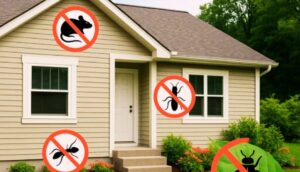How to Tell the Difference

Waking up with itchy red marks on your skin can be both irritating and confusing. One moment you’re enjoying a good night’s sleep, and the next you’re scratching away, trying to figure out what bit you. It can be especially frustrating when you’re not sure whether to blame mosquitoes or suspect that bed bugs are the culprits.
Although the bites may appear similar—red, raised, and itchy—the source behind them is quite different. Mosquito bites are usually random and often linked to recent outdoor activity. Bed bug bites, on the other hand, might indicate a hidden infestation in your sleeping area. Spotting the difference early can help you act quickly and avoid a bigger issue.
Pay attention to when and where you’re getting bitten. Mosquitoes usually go for uncovered skin like your arms, legs, or face, especially if you’ve been outside. Bed bugs tend to bite at night while you’re asleep, often leaving a pattern or line of bites along your back, stomach, or thighs—areas that are in contact with your bed.
Also, notice how often the bites are appearing. If you’re waking up with new bites regularly but haven’t been outdoors, bed bugs could be the problem. Unlike mosquitoes that come and go, bed bugs stick around and continue feeding as long as they have access to you.
Aside from the bites, look for other signs. Bed bugs can leave behind blood spots on your sheets, dark dots from droppings, or even tiny shed skins. Checking your mattress seams, bed frame, and nearby furniture can help confirm whether they’ve moved in. Early action can prevent a full-blown infestation.
If you’re not sure what’s causing your bites, don’t panic—but don’t ignore it either. Knowing how to tell mosquito bites from bed bug bites puts you in control. In the next section, we’ll guide you through how to treat the bites and what steps to take to get rid of the pests for good.
As an Amazon Associate I earn from qualifying purchases
What Do Bed Bug Bites Look Like?
Bed bug bites often show up in small groups or straight lines and tend to appear on areas of your body that are left uncovered while you sleep. Common spots include:

-
Arms
-
Neck
-
Face
-
Shoulders
-
Hands
-
Legs
These bites usually look like tiny red bumps that may be slightly swollen. Sometimes, there’s a darker spot in the middle of each bite. While they might not itch right away, the irritation can build up over time, making the bites more noticeable a few hours later.
Key Features of Bed Bug Bites:
How to Recognize Bed Bug Bites
Bed bug bites often have a distinct pattern. They tend to appear in a row or a zigzag across the skin. The bumps are usually red and slightly swollen, with a noticeable center that may be darker than the surrounding area. Some people find them itchy right away, while others feel the irritation increase hours later. In some cases, the bites don’t fully show up until a day or more after being bitten.
Typical Signs of Bed Bug Bites:

-
Form in lines or uneven zigzag shapes
-
Small, red, raised bumps with a central spot
-
Can be itchy or tender to the touch
-
May take 24–48 hours to become visible
How to Spot Mosquito Bites
Mosquito bites usually show up in no particular order, appearing anywhere a mosquito had access to bare skin. You’ll often notice the bump within minutes. These bites are round, red, and noticeably puffy in the center. They’re well-known for causing instant itching, which can make them very uncomfortable, especially in warmer weather. Compared to bed bug bites, they’re more random and tend to go away faster.
Common Features of Mosquito Bites:

-
Appear randomly and not in a pattern
-
Often larger and puffier than bed bug bites
-
Itching starts quickly after the bite
-
Usually heal within a few days
Main Differences Between Bed Bug Bites vs Mosquito Bites
Now let’s compare the two bite types side-by-side:
| Feature | Bed Bug Bites | Mosquito Bites |
|---|---|---|
| Pattern | Often in lines or clusters | Random |
| Itching | Delayed and long-lasting | Immediate and intense |
| Size | Small and flat or slightly raised | Large and raised |
| Location | Exposed areas during sleep | Any exposed skin |
| Pain | Mild or painless | Often itchy and inflamed |
| Time of Bite | At night, while sleeping | Anytime, especially outdoors |
| Bite Marks | Dark red center | Puffy center, no dark spot |
Knowing these differences helps you take the right action faster.
Symptoms to Watch For
Some symptoms overlap. However, here are signs that can help you figure out what you’re dealing with.
Bed Bug Bite Symptoms:
Identifying Bed Bug Bites
Bites from bed bugs often appear in a noticeable pattern. You might see them lined up neatly or scattered in a zigzag shape. Each bite usually looks like a small, red bump that’s slightly swollen, often with a darker spot in the center. They might not itch right away, but the discomfort usually increases over time. Some bites take a day or two to fully appear, making it tricky to connect them to the actual moment you were bitten.
Bed Bug Bite Characteristics:
-
Often follow a straight or zigzag line
-
Small, red, and raised with a darker middle
-
Can be itchy, sore, or both
-
May take a while to become visible on the skin
Recognizing Mosquito Bites
Mosquito bites tend to pop up randomly wherever your skin was exposed. You’ll usually notice them within minutes of being bitten. They appear as red, round welts with a soft, raised center. These bites are notorious for causing intense itching almost immediately. Unlike bed bug bites, mosquito bites don’t follow any pattern and are usually spread out. They also tend to fade more quickly.
Mosquito Bite Signs:
-
Appear in random spots across exposed skin
-
Typically larger and more swollen than bed bug bites
-
Start itching shortly after the bite
-
Often go away faster than bed bug bites
How Long Do The Bites Last?
Bed Bug Bites:
They can last up to 10 days or longer, especially if you keep scratching.
Mosquito Bites:
They usually fade in 1–3 days. Some may last longer if scratched or if you’re allergic.
Can You Have Allergic Reactions?
Yes. Some people are more sensitive to insect bites.
-
Bed bug bites may cause large red patches or even blisters in allergic individuals.
-
Mosquito bites can trigger hives or swelling in severe cases.
If you develop a fever, rash, or swelling beyond the bite, seek medical advice right away.
How to Treat Bed Bug Bites
-
Wash the area with soap and water.
-
Apply an anti-itch cream like hydrocortisone.
-
Take an antihistamine to reduce itching.
-
Avoid scratching to prevent infection.
-
Apply ice packs to relieve swelling.
If the bites persist or worsen, see a doctor. Also, start treating your home for bed bugs immediately.
How to Treat Mosquito Bites
-
Clean the bite with warm water and soap.
-
Apply calamine lotion or hydrocortisone.
-
Use cold compresses to ease swelling.
-
Avoid scratching to prevent infection.
-
Use antihistamines if itching is severe.
Most mosquito bites are harmless, but monitor for signs of infection or disease if bitten in high-risk areas.
How to Check for Bed Bugs at Home
If you suspect bed bugs, here’s what to look for:
-
Tiny reddish-brown bugs in mattress seams
-
Dark spots (bed bug droppings) on sheets
-
Small white eggs or eggshells
-
Blood stains on bedding
-
Musty odor near your bed
Use a flashlight to inspect seams, cracks, and nearby furniture. You can also place bed bug traps to confirm activity.
How to Prevent Bed Bug Bites
-
Inspect hotel mattresses before sleeping
-
Don’t bring in used furniture unless inspected
-
Wash and dry clothes after travel on high heat
-
Use bed bug-proof mattress covers
-
Declutter your bedroom to limit hiding spots
How to Prevent Mosquito Bites
-
Wear long sleeves and pants outdoors
-
Apply mosquito repellent with DEET or natural oils
-
Use screens on windows and doors
-
Sleep under a mosquito net if needed
-
Remove standing water around your home
When to See a Doctor
Seek medical attention if:
-
You develop blisters or infections
-
Bites spread rapidly or swell severely
-
You have a fever or chills
-
You’re bitten in a mosquito-risk area with known diseases (e.g., Zika, dengue)
-
Your bites don’t heal after two weeks
10 FAQs About Bed Bug Bites vs Mosquito Bites
Can I get bites from bed bugs and mosquitoes at the same time?
1. Yes, it’s possible to have both. If your home has a bed bug problem and you spend time outdoors where mosquitoes are active, you could end up with bites from both pests.
2. Do bed bugs bite every night?
Not always. Bed bugs don’t need to feed daily. They typically bite every few days, depending on the size of the infestation and how many bugs are present.
3. Can you feel it when a bed bug bites?
Usually not. Bed bugs inject a mild anesthetic into your skin so you won’t feel the bite when it happens. The itchiness and redness usually appear hours later.
4. Are mosquito bites more harmful than bed bug bites?
Yes, in some cases. While bed bug bites are irritating, mosquito bites can spread diseases like Zika, dengue, and malaria in certain regions.
5. Do bed bug bites spread across the skin?
No, they don’t spread like a rash. However, you might notice more bites over several days as more bugs feed.
6. Can scratching a mosquito bite make it bleed?
Yes. If scratched too hard, mosquito bites can break the skin and bleed. Bed bug bites typically don’t bleed unless they’re scratched excessively.
7. Can bed bugs live in places other than beds?
Definitely. Couches, chairs, rugs, and even behind baseboards are all fair game for bed bugs. Any soft or hidden space is a potential hiding spot.
8. Will a bed bug infestation go away on its own?
No. Bed bugs don’t leave without intervention. You’ll need to treat your home to eliminate them completely.
9. Are children more affected by bites than adults?
Yes. Kids can have stronger reactions to both mosquito and bed bug bites. Their skin may swell more, and they may experience more itching or irritation.
10. Can I treat both mosquito and bed bug bites the same way?
Yes, most basic treatments like anti-itch creams, cold compresses, and antihistamines work for both. But solving the underlying cause—whether it’s bed bugs or mosquitoes—requires a different approach.
Conclusion
Know the Difference & Act Fast
Telling bed bug bites apart from mosquito bites can save you time, money, and stress. While mosquito bites are usually harmless and short-lived, bed bug bites are a sign of an infestation that needs urgent attention.
By knowing what to look for—like bite patterns, timing, and itchiness—you’ll be better prepared to respond. And once you treat the bites, make sure to get rid of the source.
Don’t wait until a few bites turn into a full-blown infestation. Act now, treat your skin, and protect your home.
Here is our Complete Guide on Bed Bug Control
- How To Permanently Get rid Of Bed Bugs At Home?
- Best Bed Bug Pillow Protectors For Allergy Sufferers.
- 7 Best Waterproof Bed Bug Mattress Covers for Queen Size Beds.
- Best Waterproof Bed Bug Mattress Covers For King Size Beds.
- How To Get Rid Of Bed Bugs Permanently At Home.
- Do Bed Bugs Live In Wood.
- Can Bed Bugs Survive In Laundry?
If you found this guide helpful, share it with others and explore our full bed bug treatment section for more pest-fighting tips.









